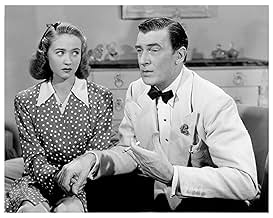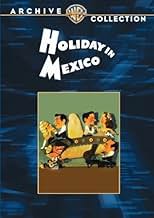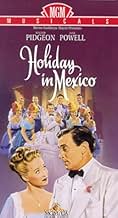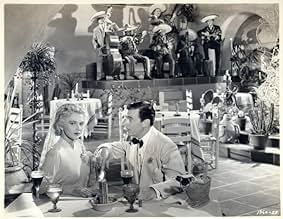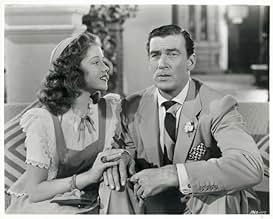Ajouter une intrigue dans votre langueThe U.S. Ambassador's (Walter Pidgeon) daughter falls for a Mexican pianist (Jose Iturbi) old enough to be her grandfather.The U.S. Ambassador's (Walter Pidgeon) daughter falls for a Mexican pianist (Jose Iturbi) old enough to be her grandfather.The U.S. Ambassador's (Walter Pidgeon) daughter falls for a Mexican pianist (Jose Iturbi) old enough to be her grandfather.
- Réalisation
- Scénario
- Casting principal
- Récompenses
- 3 victoires au total
José Iturbi
- José Iturbi
- (as Jose Iturbi)
William 'Bill' Phillips
- Sam, Evans' Chauffeur
- (as Wm. "Bill" Phillips)
Ed Agresti
- Guest
- (non crédité)
Leon Belasco
- Orchestra Leader
- (non crédité)
Brooks Benedict
- Dance Extra
- (non crédité)
Avis à la une
10hjmsia49
This is my favorite all time Hollywood musical. I saw it in 1946 at the age of 15 and was stunned by the talent of newcomer Jane Powell. MGM knew how to create a star and they pulled out all the stops in this film. From the opening scene where Jane sings "Italian Street Song," you knew this was a unique talent. Young, attractive, bubbly with a golden voice. When she sings "Ava Maria" in the final scene, you knew MGM had a new star. The musical selections were excellent throughout. They utilized Jose Iturbi perfectly by having him play two of the most popular piano classics: Rachmaninoff's 2nd Piano Concerto and Chopin's Polonaise. Beautiful Ilona Massey sang the familiar Hungarian Czardas. Walter Pigeon was perfect as Jane's father and Roddy McDowell was her poor confused beau. The plot was trite and dragged at times but it was the music that made it all worth while. Jane also sang "I Think of You" which was adapted from the same Rachmaninoff concerto. This film made me a lifelong fan of Jane Powell and I lament the fact that Hollywood no longer makes musicals like that. There is one current performer who reminds me of Jane Powell and that is Kristin Chenowith. Unfortunately, Hollywood doesn't make films anymore that would showcase her talent.
This movie is burdened mostly by poor pacing. The first half of the film is a long string of diverse musical numbers connected by a few lines of dialog. Then the director seemed to realize that some kind of plot development was necessary, so the musical numbers are few and far between in the second half of the movie, which is dedicated to getting the flimsy plot moving. Then there's the grand finale with Jane Powell delivering a beautiful rendition of "Ave Maria."
Not once did I feel like I was in Mexico City. Believe it or not, you will see more keffiyehs than sombreros in this movie! Maybe the director thought it was Holiday in Morocco. However, some of the costumes are beautiful - especially some of Jane Powell's dresses.
Walter Pidgeon, who I usually like, is only fair in his role as the US Ambassador to Mexico and an all-wise, empathetic and loving, but somewhat condescending father. Jane Powell has a beautiful voice, but her acting is erratic and bordering on manic in some of the early scenes. Jose Iturbi never was an actor, but had a film career based solely on his being an excellent pianist. Ilona Massey is, likewise, not a great actress, but she is beautiful and hot. Roddy MacDowell has such a high-pitched, soft voice, it is hard for me to ever find him very convincing as a serious love-interest, even as a teenager. At the end of the day, every minute of this film seems like it is populated not by real people, but by actors playing roles.
If you like a fairly wide range of music, then the first part of this movie will delight you. I personally wanted to come up for more air between musical numbers. The two best scenes are in the second half. The funniest scene is between Pidgeon and the parents of one of his daughter's girlfriends. It is the cleverest plot device in a plot riddled with every cinematic cliché of the era, and it is quite ironic, with Pidgeon discovering he is the object of the affections of the young daughter of one of his ambassadorial colleagues.
The penultimate scene in which Pidgeon talks frankly with Powell, his daughter, about facing up to life after you've made a fool of yourself is worth wading through the trite plot, clichés and front-loaded music. And her response, as depicted in the climactic scene is suitably uplifting.
Spreading the musical numbers more evenly throughout the film, and developing the plot in a more even manner, too, would have improved this film quite a bit. As it is, it is more like sitting through two performances - first, a short concert, followed by a short film.
Not once did I feel like I was in Mexico City. Believe it or not, you will see more keffiyehs than sombreros in this movie! Maybe the director thought it was Holiday in Morocco. However, some of the costumes are beautiful - especially some of Jane Powell's dresses.
Walter Pidgeon, who I usually like, is only fair in his role as the US Ambassador to Mexico and an all-wise, empathetic and loving, but somewhat condescending father. Jane Powell has a beautiful voice, but her acting is erratic and bordering on manic in some of the early scenes. Jose Iturbi never was an actor, but had a film career based solely on his being an excellent pianist. Ilona Massey is, likewise, not a great actress, but she is beautiful and hot. Roddy MacDowell has such a high-pitched, soft voice, it is hard for me to ever find him very convincing as a serious love-interest, even as a teenager. At the end of the day, every minute of this film seems like it is populated not by real people, but by actors playing roles.
If you like a fairly wide range of music, then the first part of this movie will delight you. I personally wanted to come up for more air between musical numbers. The two best scenes are in the second half. The funniest scene is between Pidgeon and the parents of one of his daughter's girlfriends. It is the cleverest plot device in a plot riddled with every cinematic cliché of the era, and it is quite ironic, with Pidgeon discovering he is the object of the affections of the young daughter of one of his ambassadorial colleagues.
The penultimate scene in which Pidgeon talks frankly with Powell, his daughter, about facing up to life after you've made a fool of yourself is worth wading through the trite plot, clichés and front-loaded music. And her response, as depicted in the climactic scene is suitably uplifting.
Spreading the musical numbers more evenly throughout the film, and developing the plot in a more even manner, too, would have improved this film quite a bit. As it is, it is more like sitting through two performances - first, a short concert, followed by a short film.
'Holiday in Mexico' may not be a great film, but it is good at what it set out to do, doesn't try to be any more than it is and knows exactly what it wants to be.
Its weak link is the thin and insipid story, the first half being almost plot less, which also suffers from draggy pacing that is especially uninteresting in the scenes between Roddy McDowell and Jane Powell that dominate too much of the second half. The overlong length, not unusual in George Sidney's 1940s films. McDowell has an annoying caricature character, and not only does he do little with it but he does grate somewhat.
There is so much to enjoy about 'Holiday in Mexico' on the other hand. Even with not much authentic Mexico in sight, being on the most part more Culver City soundstage than Mexico, it is a lovely looking film, being beautifully shot in rich colour and handsomely produced. The music is similarly great, with a mix of pleasant songs and the divine piano music of Chopin and Rachmaninov masterfully played by Jose Iturbi, in every film he appeared in his piano playing was some of the finest on film.
Scripting is not exceptional, but sweet and amusing and nowhere near as trite as the story. The bittersweet romance between Ilona Massey and Walter Pidgeon has been criticised, to me it had a lot of affecting charm. Other great things are the knockout piano choreography and the clever animated title sequence, courtesy of Hanna-Barbera, that is the most evocative of Mexico that 'Holiday in Mexico' gets.
Powell is very charming and sings beautifully, and while Massey is not as natural an actress she is still likable enough. Iturbi and Xavier Cugat add enormously to the film and Pidgeon is similarly likable. Sidney directs with competence.
All in all, lots of fun and charm though not without its flaws. 7/10 Bethany Cox
Its weak link is the thin and insipid story, the first half being almost plot less, which also suffers from draggy pacing that is especially uninteresting in the scenes between Roddy McDowell and Jane Powell that dominate too much of the second half. The overlong length, not unusual in George Sidney's 1940s films. McDowell has an annoying caricature character, and not only does he do little with it but he does grate somewhat.
There is so much to enjoy about 'Holiday in Mexico' on the other hand. Even with not much authentic Mexico in sight, being on the most part more Culver City soundstage than Mexico, it is a lovely looking film, being beautifully shot in rich colour and handsomely produced. The music is similarly great, with a mix of pleasant songs and the divine piano music of Chopin and Rachmaninov masterfully played by Jose Iturbi, in every film he appeared in his piano playing was some of the finest on film.
Scripting is not exceptional, but sweet and amusing and nowhere near as trite as the story. The bittersweet romance between Ilona Massey and Walter Pidgeon has been criticised, to me it had a lot of affecting charm. Other great things are the knockout piano choreography and the clever animated title sequence, courtesy of Hanna-Barbera, that is the most evocative of Mexico that 'Holiday in Mexico' gets.
Powell is very charming and sings beautifully, and while Massey is not as natural an actress she is still likable enough. Iturbi and Xavier Cugat add enormously to the film and Pidgeon is similarly likable. Sidney directs with competence.
All in all, lots of fun and charm though not without its flaws. 7/10 Bethany Cox
Randall Brandt is exactly right. This is a "Holiday in Mexico"? Produced by MGM at the height of its power, glory, not to mention financial resources, and yet the darned thing never gets outside a Culver City sound stage? Couldn't they at least have sent a camera crew to Mexico City to film some establishing shots in the major thoroughfares, parks, museums, etc.? Very disappointing.
This might just as well have been titled "Holiday in Burbank."
As to the story, it's flimsy at best. In its favor is the rich Technicolor photography which has never been equaled, plus some good musical numbers. The cast is good, with Walter Pidgeon in his most ambassadorial form as the father of the spunky young Jane Powell. Jose Iturbi and his sister play some great piano, as well!
Worth viewing, though at 128 minutes it's a bit long. "Holiday in Mexico" is an example of how Hollywood used to view (or didn't view) other countries.
This might just as well have been titled "Holiday in Burbank."
As to the story, it's flimsy at best. In its favor is the rich Technicolor photography which has never been equaled, plus some good musical numbers. The cast is good, with Walter Pidgeon in his most ambassadorial form as the father of the spunky young Jane Powell. Jose Iturbi and his sister play some great piano, as well!
Worth viewing, though at 128 minutes it's a bit long. "Holiday in Mexico" is an example of how Hollywood used to view (or didn't view) other countries.
If you have an hour and a half to kill and enjoy Jane Powell's singing and Walter Pidgeon's dashing good looks, this beats the heck out of watching this week's third installment of Dateline NBC. Seriously, the music is very good, the comedy is fast, and the sweetness is easy to take. Totally forgettable fluff, but an enjoyable way to pass time.
Le saviez-vous
- AnecdotesContrary to rumor, a young Fidel Castro does not appear as an extra. The rumor grew from two sources: his yearbook, in which teachers noted that he was "somewhat of an actor," and a 1943 interview where Xavier Cugat cryptically referred to one of his dancers becoming "a South American general." In his 1948, Cugat references being an acquaintance of Huber Benitez, who later became a General and supporter of Fulgencio Batista, whom Castro overthrew in 1959.
- GaffesAfter her party, Christine and her father are talking in her room. There is a close-up of the drawing of her father. In later shots, it is a different picture. The face in the picture is at a different angle.
- Citations
Jeffrey Evans: Is Stanley pretty upset over your going?
Christine Evans: Yes.
Jeffrey Evans: Well, you've hurt him a lot lately - once more won't kill him.
Christine Evans: But I never meant to hurt his feelings.
Jeffrey Evans: You know, uh, if you hurt someone, it doesn't matter very much whether you meant to or not.
- Versions alternatives"Why So Gloomy?", a musical number featuring Jane Powell and a Chinese boy, was cut from the film. It is included in the "Musical Jukebox" feature of the 2004 That's Entertainment! DVD box set.
- ConnexionsEdited into Moments in Music (1950)
- Bandes originalesI Think of You
(uncredited)
Music based on "Piano Concerto No.2" by Sergei Rachmaninoff
Music Adaptation and Lyrics by Jack Elliott & Don Marcotte
Meilleurs choix
Connectez-vous pour évaluer et suivre la liste de favoris afin de recevoir des recommandations personnalisées
Détails
Box-office
- Budget
- 2 345 000 $US (estimé)
- Durée
- 2h 8min(128 min)
- Rapport de forme
- 1.37 : 1
Contribuer à cette page
Suggérer une modification ou ajouter du contenu manquant

